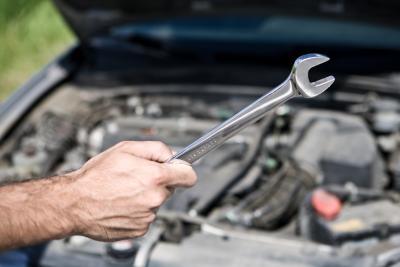
Converting an engine from gas to alcohol is a complicated procedure requiring specialized knowledge and mechanical skill. Specific steps to modify an engine can vary greatly depending on factors such as age, size, ignition and fuel systems. Regardless of the specifics, certain concepts apply for all gas to alcohol conversions.
Obtain an engine to be used for the conversion. If possible, secure a set of specifications for the engine. The engine you choose should be in good condition and run properly on gasoline. Engines that run poorly or need a complete rebuild will complicate the conversion process.
Find a well-lighted work space and gather the necessary tools to remove and reinstall the various components of the engine's fuel and ignition systems.
Determine what replacement parts will be needed to modify the fuel and ignition systems and obtain them prior to beginning modifications.
Obtain a supply of ethyl alcohol to be used as fuel. Store this safely in a well ventilated area. A 5-gallon fuel can with detachable spout is ideal.
Using the existing fuel tank, pump and lines will work well for most conversions. If you are planning to switch back and forth between gasoline and alcohol, a secondary fuel tank and pump as well as additional fuel line and a t-valve will need to be installed.
Be prepared to replace the fuel filter several times after converting the fuel system. Alcohol tends to clean the fuel systems on older engines and the loosened grime will quickly plug the fuel filter.
Alcohol engines require an increased fuel flow to achieve the same power as gasoline engines. Depending on the type of fuel system, you will need to increase the size of your engine's fuel injectors. If the engine is an older model with a carburetor you will need to increase the size of the metering jets to allow increased fuel flow. Race shops that carry parts for alcohol burning engines are an excellent source for the necessary parts.
If the engine has a carburetor instead of fuel injection you will also need to modify or replace the carburetor's float. This will allow the float bowl to retain a larger quantity of fuel to accommodate the increased fuel flow.
Install a high energy ignition system. Alcohol does not vaporize as well as gasoline, especially in cold weather. High energy electronic ignition systems will go a long way in solving this problem.
The spark plugs recommended for your engine will generally work fine. If you are planning on running your converted engine for long periods or in very hot weather, you may benefit from replacing the recommended plugs with cooler ones.
Advance the engine's ignition timing approximately 5 to 8 degrees. Ignition timing on gas engines is retarded slightly to help reduce the amount of nitrogen oxides omitted. Additionally, advancing the timing too far on a gasoline engine will cause it to knock. Alcohol-burning engines do not have these problems.